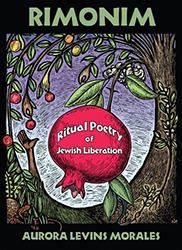Google “dybbuk” and you’ll keep returning to the same image: a naked man with desolation in his eyes carrying a skeleton on his back. In Jewish mysticism, it’s known that once the spirit enters a human body, it cleaves, clings to, and possesses it. The dybbuk is Joshua Gottlieb-Miller’s central metaphor in Dybbuk Americana, and speaks specifically to “competing selves in the body.” With straightforward yet lyrical poems, Gottlieb-Miller’s second collection thoughtfully interrogates how Jews in the United States can carry multiple selves (or skeletons) everywhere we go.
If you were raised Jewish in America — and maybe feel a little identity-frazzled — it’s easy to see yourself in Gottlieb-Miller’s poems. Stellar line breaks — “not sure, who am I / trying to fool” or, in reference to his son, Owen. “He’s confused / what the prayers are / for. He escapes” — not only depict two generations of Jewish inquiry but also show that even the simplest phrases can pave the way for deep reflection. Gottlieb-Miller’s son is a recurring character in the collection. As young as he appears to be in these poems (Gottlieb-Miller mentions, for example, buckling his seatbelt in “Possession”), there are still plenty of parallels between Owen’s self-interrogation and the adult speaker’s. This underscores that questioning one’s religious identity is not limited to the young, but continues and deepens over a lifetime.
And it’s not just Owen and the speaker who are concerned with their religious identities. Gottlieb-Miller writes about Jews changing their last names to fit an Anglo-Saxon American norm; quotes novelist Philip Roth talking about his desire to be known as an “author,” not just a “Jewish author”; and ponders Jewish “whiteness.” “Can money whiten?” he asks in “A Double Bind.” Then, in “White Ethnics,” Gottlieb-Miller reflects on whether immigrants must “acquire whiteness” to feel accepted in the United States. Must you “act white?” he wonders.
Being Jewish in America (at least according to Gottlieb-Miller) requires adding and subtracting parts of yourself that do and don’t fit the cultural norm. Perhaps not a novel observation about American life, but a radical one for Jews, always seen as pendulum extremities — either a “model minority,” or “the reason for all that’s wrong in the world.” The poetry’s hybrid form speaks to its content, asking similar identity questions. If Gottlieb-Miller was writing, say, solely in sonnets, the questions would be different. But, for example, in “Is It Wrong That I Find Comfort In Finding Myself,” in which he writes about the difficulty of finding oneself in the face of stereotype, text in transparent boxes and in italics mention the stereotypes of Jews, whereas normal text indicates the speaker’s voice.
Gottlieb-Miller’s poetry has created a conundrum: how do American Jews reckon with our competing selves? Readers get no real answer, though answering questions was likely not the book’s point: beyond being a lyrical, genre-bending work of poetry, Dybbuk Americana is a conversation-starter. American Jews who read Gottlieb-Miller’s poetry will question what we accept as normal, and learn to find answers on our own. If we’re carrying these skeletons on our backs, we might as well take the time to understand them.
Ruby Rosenthal is a writer and editor based in Chicago. A 2024 Hollins University MFA grad, her work has been published in The Chicago Review of Books, HerStry, Defenestration, and elsewhere. She currently works as an assistant to a novelist.





